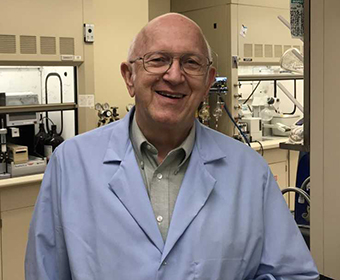
Michael P. Doyle is one of the founders of the consortium that organizes the international symposium.
JANUARY 28, 2020 — The UTSA Department of Chemistry will host the third International Symposium on Carbene and Nitrene Chemistry from Feb. 5 to 7 at the historic Menger Hotel in San Antonio’s Alamo Plaza. This will mark the very first time the biennial symposium has been held in North America.
The inaugural event took place at the University of Hong Kong in 2016 and the second symposium was hosted by Peking University in China in 2018.
The symposium is the creation of the Metal-Carbene Consortium, which was established in 2015 to bring together world leaders versed in the rapidly evolving scientific applications of catalysis, drug design, materials development, and biological uses. The consortium and its flagship event encourage research, foster collaborations, and publicize new developments in metal carbene chemistry and related areas internationally.
—WALDEMAR GORSKI, Chair of the Department of Chemistry
“This area of science has emerged as one of the most exciting scientific developments for the selective construction of molecules and the development of highly selective catalysts—and UTSA is a center for these discoveries,” said Michael P. Doyle, Rita and John Feik Distinguished University Chair in medicinal chemistry at UTSA and one of the founders of the Metal-Carbene Consortium. Doyle was recently awarded the 2020 International Precious Metals Institute’s Henry J. Albert Award for his pioneering work with rhodium catalyst reactions.
The San Antonio symposium will feature lectures by prolific carbene and nitrene chemistry researchers from universities around the world, as well as poster sessions for contributing presentations. Lecturers include members of the Chinese Academy of Sciences, Irish Academy of Sciences, and French Académie des Sciences, in addition to the president of the Spanish Royal Society of Chemistry, and Doug Frantz, UTSA’s Max and Minnie Tomerlin Voelcker Distinguished Professor of Chemistry. Lecturers from nine U.S. states, Canada, Switzerland, Germany, Japan, and Poland will also give presentations during the three-day event.
“Dr. Doyle has organized this symposium to advance the global discussion of the progress and potential of this important type of chemistry,” said Waldemar Gorski, chair of UTSA’s Department of Chemistry. “It is inspiring that UTSA is hosting it.”
Topics that will be covered at the symposium include catalytic reactions of metal carbenes and nitrenes and their applications, novel ways to generate carbenes and nitrenes, carbenes as catalysts, and theoretical implications for carbene and nitrene reactions. Attendees will also discuss applications in biology and medicine, materials development, mechanistic understanding, and late-stage functionalization.
Visit the Metal-Carbene Consortium website to register for the event and learn more about the program.
Connect with UTSA online at Facebook, Twitter, YouTube, Instagram and LinkedIn.
UTSA Today is produced by University Communications and Marketing, the official news source of The University of Texas at San Antonio. Send your feedback to news@utsa.edu. Keep up-to-date on UTSA news by visiting UTSA Today. Connect with UTSA online at Facebook, Twitter, Youtube and Instagram.
Move In To COLFA is strongly recommended for new students in COLFA. It gives you the chance to learn about the Student Success Center, campus resources and meet new friends!
Academic Classroom: Lecture Hall (MH 2.01.10,) McKinney Humanities BldgWe invite you to join us for Birds Up! Downtown, an exciting welcome back event designed to connect students with the different departments at the Downtown Campus. Students will have the opportunity to learn about some of the departments on campus, gain access to different resources, and collect some giveaways!
Bill Miller PlazaCome and celebrate this year's homecoming at the Downtown Campus with food, games, giveaways, music, and more. We look forward to seeing your Roadrunner Spirit!
Bill Miller PlazaThe University of Texas at San Antonio is dedicated to the advancement of knowledge through research and discovery, teaching and learning, community engagement and public service. As an institution of access and excellence, UTSA embraces multicultural traditions and serves as a center for intellectual and creative resources as well as a catalyst for socioeconomic development and the commercialization of intellectual property - for Texas, the nation and the world.
To be a premier public research university, providing access to educational excellence and preparing citizen leaders for the global environment.
We encourage an environment of dialogue and discovery, where integrity, excellence, respect, collaboration and innovation are fostered.